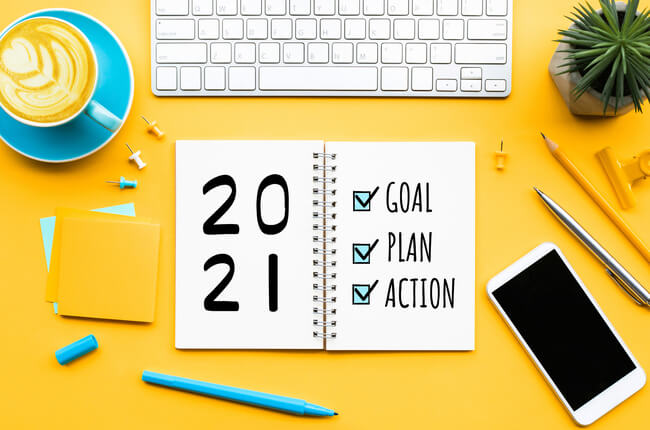
Why set goals for 2021 when we’re still fighting COVID-19?
It’s a good question – and one many of us have likely asked ourselves over the last few weeks.
Finding goals, or even making a shortlist of things to look forward to, isn’t easy when we’re living in restrictions on what we do, who we see and where we go.
But as we move further away from 2020 and start to think about what challenges and opportunities 2021 will bring, we can still take steps to make this year better for ourselves and the people around us.
Put our own health first
For so many of us, being mindful of our mental and physical health and wellbeing has never been more important.
Not just because of the threat of unwittingly spreading a virus to vulnerable people, but because we already know the impact of lockdown and loneliness can have on our thoughts and feelings.
If you only make one goal for 2021, putting your health first won’t just give you something to work towards, it will protect yourself and others.
Keep it simple to start with by embracing the COVID-19 hygiene advice:
- Wash your hands
- Keep your distance
- Wear a mask
- Save lives
Make goals that matter
“Here in the UK, unemployment has risen and people have been facing ongoing lockdowns since March 2020,” said Maria Galani from CiC.
“Social isolation is an added barrier which has had huge toll on the mental health of many.
“This past year has forced many of us out of our comfort zones and made us question whether it is even appropriate to set any goals.”
“Instead, maybe reconsider what your goals look like in 2021 – perhaps your goal is to focus on becoming more adaptable to change and developing greater self-compassion.”
“These are key skills that can help you maintain resilience, appreciate what you have, and not fight against things that are outside of your control,” she said.
Now, more than ever, it is important to heed the advice of the experts when setting our professional and personal goals for 2021.
“Always set goals. It is what makes us human,” said CEO and Organisational Psychologist from FBG, Simon Brown-Greaves.
“You can reduce the context factor by choosing goals that are independent of circumstances – for example, my goal might be to improve my core strength, which can be done through a variety of mechanisms, regardless of any lockdown.
“And be flexible – as circumstances change, re-evaluate but don’t give up. We are remarkably resilient,” he added.

10 steps to setting achievable goals in 2021
Whether we plan to spend more ‘quality’ time with our kids, lose a few kilos, or take up knitting, there is something about starting a fresh new year that has us setting goals and articulating our aspirations.
But this isn’t about setting New Year’s resolutions.
In fact studies suggest less than 25% of people actually stay committed to resolutions after 30 days, and only 8% accomplish them.
We’ve all heard the adage to write down our goals (based on a now-discredited Harvard study) to improve our chances of success – but there’s more to it than that.
By taking time to think about our approach and act on our plan, we are more likely to succeed, and for our achievements to be sustainable. (Latham & Locke, 1991).
And to make it easier – we asked our psychological experts from across the globe to share their tips for success.
1. Don’t treat your goals like resolutions
First, it’s important to remember there is a difference between making resolutions and setting goals. (Especially when made at 12:01am on January 1 with a celebratory glass in hand).
Let’s be honest, resolutions are generally non-specific – a broad intention to do (or not do) something.
Goals are much more structured, usually involving some sort of plan and outcome – and are much more likely to succeed (Kleingeld, et al, 2011).
Importantly, setting goals is linked with better self-confidence, motivation, and autonomy (Locke & Latham, 2006).
“Whatever you do, don’t set your goal on New Year’s Eve – it’s like doing a supermarket shop when you haven’t eaten for 24 hours,” said Simon.
“Instead, set them in the first weeks of January whilst sober and calm.”
2. Know why you want to achieve your goal
“It’s critical to stop and think about why you want to achieve this goal,” says Beulah Joseph, principal psychologist at Assure Programs.
“Carefully consider what is driving you toward this desired state, and in particular, which of your needs aren’t being met today. Also think about your values – how can you align your deeply held values to your goal?
“For example, if one of your values is on supporting your community, and your goal is to run 5k, you could combine those into a goal of running in a 5k event for a local charity,” Beulah added.
3. Identify the barriers to achieving your goal
This step isn’t to let us make excuses – in fact, it is the opposite.
It is important to take time to reflect on what might stop us from achieving our goal, so we can put in place strategies to address them or figure out how to work within what is possible.
This is obviously important while we face lockdown restrictions.
“Try to be objective, if you can,” Beulah suggests.
“Take a step out of your day-to-day life and evaluate the ‘lay of the land’.
“If you have small children, is it going to be easy to exercise for several hours every day?
“If you want to get back into the workforce after a career pause, have your skills gone out of date?”
4. Be honest and real with yourself
It is important to identify where we are starting from, and to be truly honest with ourselves about where we are in life and what we can realistically achieve.
From there, we can evaluate what is a realistic and achievable goal – we may need to do some research and talk to some experts in the field about this.
“You might like to look at forming your goals in such a way that they are a stretch, but achievable, and can be measured in some way,” said Maria from CiC.

5. Measure and track your progress
“You should definitely set your milestones at this stage,” Beulah said.
“Think about how you will measure progress and make a record of where your starting point is.
“If you want to lose weight, you might think about measurements such as weight loss, ranking your daily energy levels, or how your clothes feel.
“This way, you can start to track and measure against multiple points,” she added.
Maria from CiC also emphasises the importance of measure our success.
“There is no point in setting a target or a goal if you don’t realise when you get there!” she said.
6. Be SMART
You’ve likely heard it before as it is commonly held that using SMART goals (Specific, Measurable, Achievable, Relevant and Time-framed) is a simple way of making goal setting efficient and productive.
Of course, having a timeframe during lockdown isn’t easy, so remember to be flexible with your milestones and any target achievement times you set.
- Specific: goals should be clear and concise.
- Measurable: goals should be quantifiable so that progress can be tracked.
- Achievable: goals should be challenging yet achievable.
- Relevant: goals should add value and align with other goals or values you have.
- Time-framed: goals should have a target achievement time to maintain motivation, where practical.
“SMART is definitely the best mechanism for goal setting. Sometimes though we tend to forget the A (achievable) and the R (realistic) in the acronym.
“It’s great to have something to always strive for and achieve. It’s simply not always possible however to do everything,” said Denise Meyerson, Founder and Director of MCI.
“It’s not possible to eat every correct fruit and vegetable with zero fat or sugar AND go to the gym every day AND swallow all your vitamins AND walk your 10,000 steps and so on.
“Be kind on yourself and create targets that are within reach with a good dose of motivation and perseverance.”
7. Be accountable
Recent research by Matthews (2015) identified an alternative approach to setting goals which demonstrated a 33% increase in goal achievement:
- Write goals down
- Commit to goal-directed actions
- Create accountability for actions by sharing your plan
- Report on your progress
“Having a buddy – someone you are accountable to, but also someone that can support you during challenging times, and to celebrate success with you – is so important,” Beulah added.
A buddy who shares the same or similar goal is also a great help, though as Simon from FBG Group advises, it can be difficult if they’re your partner too.
“Reconsider having a romantic partner as a buddy for challenging or possibly unrealistic goals – it can put a lot of stress on your relationship,” he added.
Sharing goals with other people in similar lockdown restrictions as yourself is a good way to stay connected and increase social interaction even if when we can’t meet in person.

8. Break it down
We shouldn’t just set one big goal and be done.
Instead we can break our goal down into smaller steps, or sub-goals.
This helps keep us motivated, on track, and makes the challenge more manageable.
If it’s exercising at home, we can set a target of push ups, crunches or squats everyday and track our progress.
If it’s to do more writing, art or other creative tasks at home, we can set a deadline to complete part of the project by to help stay focused and committed.
9. Celebrate success
Finally, one we can all enjoy is celebrate our success.
For each milestone, as well as each major achievement, take a moment to celebrate.
A quick catch up with our team, an online shopping reward worth working towards or a treat with a friend, sparks the joy and excitement that drives us to further success.
As long as the reward doesn’t undermine our goal!
10. Don’t dwell on the missteps
Psychologist Beulah reminded us it’s ok if we miss or are unable to reach a small step or part of our goal.
“It is not a sign of failure, but a sign of being human – of life. It’s part of the process,” she said.
“What is important is that you adapt and be flexible – reset and move on.
“This year, and probably the year to come, has proven to most of us that as humans we are a finite resource, and sometimes there is just nothing left in the tank. And that is ok.
“It makes sense given what we have had to deal with. We are not failures as a result of that”.
Additional resources:
- CiC’s advice on celebrating every win
- Assure on the psychology of New Year resolutions